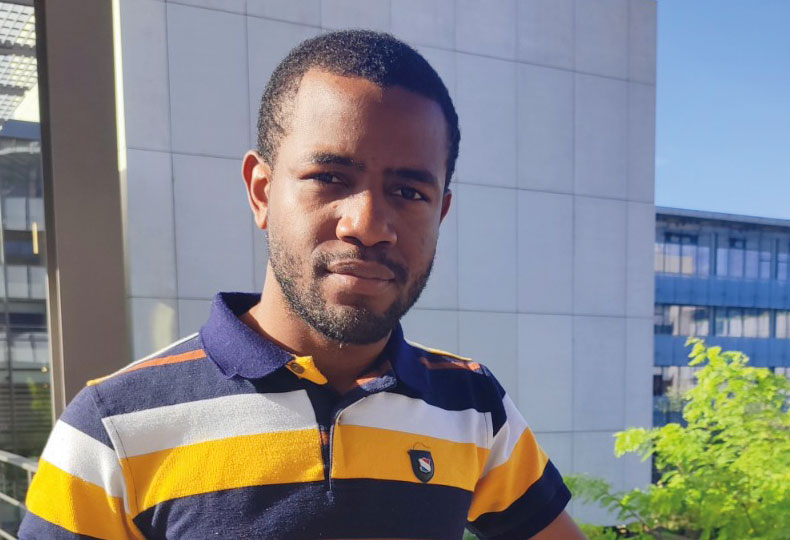A seismic PhD track

From Douala to Paris-Saclay
Alexis Blaise Talla Simo, a student at the Ecole Normale Supérieure, is the winner of a PhD Track scholarship from the Institut de Radioactivité et de Sureté Nucléaire (IRSN) for the academic year 2022-2023.
The example of one of his professors at the École normale supérieure de l'enseignement technique (ENSET) in Douala (Cameroon) inspired Alexis Blaise to pursue a PhD in France.
A graduate of the École Normale Supérieure studying civil and environmental engineering
At the end of his studies in civil engineering, Alexis Blaise applied to the University of Paris-Saclay and joined the ENS Paris-Saclay as a student of the Ecole Normale Supérieure.
"When I arrived in France with my master's degree in hand, I was not able to commit directly to a thesis, but I am fortunate to be studying at ENS Paris-Saclay. I have already learned a lot last year in Master 1 of civil engineering, option materials and structures. I met Benjamin Richard, head of the laboratory at the Institute of Radioactivity and Nuclear Safety (IRSN) and head of the technical and scientific committee of the French Association of Earthquake Engineering, who teaches at the school.
"When IRSN offered a PhD Track Entreprise scholarship, I jumped at the chance to enroll in a 'track' to the Ph.D." explains Alexis Blaise.
"I am very happy that the jury selected my application on the dynamics of structures. This grant will allow me to devote myself fully to my study project and to benefit from a double academic and industrial supervision."
A study project on the dynamics of structures
The study project proposed by Alexis Blaise won over the academic jury and IRSN. For Benjamin Richard, his future tutor at IRSN: "Alexis Blaise's application immediately caught my attention. Indeed, Alexis was able to present a very coherent medium-term project and was immediately interested in the subject that was proposed to him. His motivation was also evident during his audition; it was clear that he had begun to appropriate the different concepts with which he would be working. "
After a Master's degree in Materials and Structural Engineering, Alexis Blaise would like to complete his studies with a second Master's degree in Dynamics of Structures and Systems, at the University of Lyon. His thesis project will focus on the response of structures to earthquakes, and more specifically on structures affected by corrosion.
Olivier Hubert, in charge of the doctoral program, explains: "The candidate made a very good presentation and his motivation convinced the members of the jury. Our partner IRSN was discovering the PhD Track format and its relevance for the student and the partner laboratory. A very positive start to a first experience. "
PhD Track, a selective program of excellence
The PhD Track is a program of excellence open to Normalien students for their last two years of studies at the Ecole Centrale Paris (specific year of the track and Master 2). In addition to a financial grant, the laureates benefit from personalized support by a tutor, a researcher or teacher-researcher from a teaching and research department of ENS Paris-Saclay, in order to build their future doctoral project. This year, the School has selected seven PhD track fellows, including Alexis Blaise Talla Simo, winner of the PhD track financed by the IRSN.
A triple win partnership
The partner is convinced of the value of the PhD track. "For the laboratory I run," confirms Benjamin Richard, "I think this program is a real opportunity! Indeed, within the framework of the partnership, candidates and subjects of common interest are selected collectively: everyone should benefit, the School, IRSN and the selected candidate. This support and follow-up approach allows for the gradual development of skills that will be put to good use in dealing with issues arising in the nuclear industry. It is therefore clearly a lever to avoid the absence of pragmatic spin-offs at the end of the thesis.
Moreover, candidates who benefit from this scheme naturally have knowledge of industrial issues, the associated challenges and IRSN. Because the skills they have developed are those that interest the Institute, they form a pool of potential candidates to join it."
